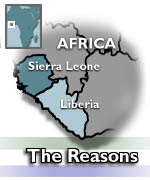The Sierra Leone Crisis
Since Sierra Leone became independent on 27 April 1961, Britain has continued to maintain connections with its former colony.
Britain has a long history of involvement with Sierra Leone, which was one of its first West African colonies.
In the current crisis, British troops were initially sent to help with the evacuation of foreign nationals, but have gone on to provide logistical support to the beleaguered UN operation.
Over the past five years, Britain's decision to maintain links with war-torn Sierra Leone has been at a high cost.
Colonial links
In 1787, Britain established a refuge in Sierra Leone for freed slaves from all parts of Africa, with Freetown as the capital.
The Creoles, as they came to be known, who were cut off from their traditions by the experience of slavery, assimilated British lifestyles and built a flourishing trade on the West African coast.
In 1827 the first European-style university was built in Sierra Leone, which soon became a centre for English-speaking Africans from the West Coast.
However, the British and Creoles were bitterly resented by the indigenous population.
A series of coups and counter-coups followed Sierra Leone's independence in 1961.
In May 1997 Major General Johnny Paul Koroma deposed President Kabbah, who had been democratically-elected in multi-party elections in 1996.
On 8 October 1997 the United Nations Security Council adopted a resolution, which Britain helped draft, introducing sanctions against the regime in Sierra Leone.
The UN resolution 1132 also introduced an international ban on the supply of arms and petroleum products.
Yet despite this ban, allies of President Kabbah hired British firm Sandline International to provide logistical support for a counter-coup.
Sandline arranged for a shipment of 35 tons of Bulgarian-made AK-47 rifles to Sierra Leone.
They say the shipment was made after consultation with the Foreign Office, and that the understanding was that the embargo only applied to the military junta, not the deposed regime of Kabbah.
This caused a political row in Westminster after the Foreign Affairs Select Committee clashed with Foreign Secretary Robin Cook over access to documents from his department.
A government inquiry under Sir Thomas Legg found that no ministers had encouraged Sandline in its sanctions-busting arms shipment.
Sierra Leone displaced by the struggle for gems.
The civil war in Sierra Leone has been financed by diamonds, and has always largely been a conflict about who controls the fabulous prize of the country's diamond mines.
The latest wave of instability has come about as United Nations peacekeepers have tried to wrest control of the mines from rebels who have held on to them in contravention of a regional peace deal brokered a year ago.
It is easy to say the gems have been a curse on the country, especially as hardly any of the proceeds of mining have reached ordinary people, who remain among the poorest anywhere in the world.
Millions of dollars worth of high-quality diamonds are mined in Sierra Leone's eastern and northern badlands every month, much of the haul being smuggled out of the country.
Deposits are to be found close to ground level so men with guns employ labourers simply to dig holes and see what turns up.
The diamond fields are in territory controlled by the feared rebel army of the Revolutionary United Front (RUF) led by Foday Sankoh.
The RUF youths have done nothing to relinquish their control of the mines to UN forces as required under the 1999 peace accord signed in the Togolese capital Lome.
Over the last two years, the value of official annual diamond exports by Sierra Leone has halved to $30m.
In the same period, diamond exports by neighbouring Liberia - a country which possesses relatively few diamond fields - has risen dramatically to $300m.
These fluctuations give the lie to denials by the Liberian Government of Charles Taylor, a former rebel leader with historical links with Mr Sankoh's RUF, that it has any interest or involvement in prolonging the war in Sierra Leone.
Indeed, the recently-visiting Canadian Foreign Minister, Lloyd Axworthy, observed that this year's instability in Sierra Leone had been sparked in part by UN forces trying to wrestle control of the diamond-producing areas from the rebels.
Sierra Leone Web
^^ Back to top
